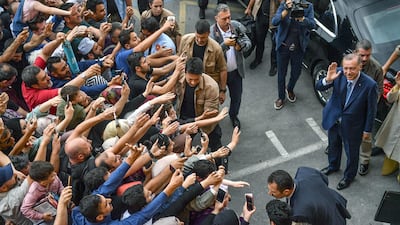Turkish President Recep Tayyip Erdogan bolstered his reputation as a winner on Monday, securing the presidency and parliament following a gamble to call early elections.
Opponents' allegations about voter fraud were not enough to tarnish the 64-year-old president's moment after official figures confirmed his victory and rivals conceded defeat.
Mr Erdogan, who has held power for more than 15 years, won the presidential race with 52.4 per cent of the vote, avoiding a runoff.
His Justice and Development Party (AKP) did not secure a majority in parliament, but a coalition with the Nationalist Action Party (MHP) will give them control of more than half the seats.
______________
More on Turkey Elections:
Erdogan declares total victory but opposition remains defiant
Turkey elections - live updates as Erdogan aims to retain presidency
Everything you need to know about the Turkish elections
______________
The president's chief rival, Muharrem Ince, conceded defeat on Monday after securing 30.8 per cent of the vote in a poll turnout the election authority described as healthy.
Appearing at the Ankara headquarters of the Republican People’s Party (CHP), Mr Ince said that allegations of voting irregularity could not account for Mr Erdogan’s victory.
“Has there been fraud?” he asked. “Of course. Has there been fraud to impact 10 per cent? No.”
His own party’s poll data matched the results declared by the Supreme Electoral Council, he said. “If you cannot congratulate your opponent after the elections, you should not run."
Mr Ince, a 54-year-old former physics teacher, denied rumours that he or his family were threatened – claims that emerged after he conceded defeat in an early-hours text message to a TV news presenter.
“I should not have done that,” he said. “I should have known better. I apologise.”
Despite his concessionary tone and calling for Mr Erdogan to “embrace everyone”, Mr Ince warned that Turkey had “cut its ties with democratic values” and had “transitioned to a one-man regime in the fullest sense”.
After a referendum last year narrowly approved Turkey's switch to a powerful executive presidency, Mr Erdogan will now assume sweeping powers with limited checks and balances.
Mr Ince, who has been an MP since 2002, now has no official role but indicated he would continue his political career and focus on local elections in March.
“Fifteen million citizens cast their votes for me and I will continue the struggle,” he said.
The CHP last secured more than 30 per cent of the vote in 1977.
Avoiding questions on his future in the CHP, he said he would soon meet party leader Kemal Kilicdaroglu, whom he has twice challenged for the leadership.
Meanwhile, the candidate for the pro-Kurdish Peoples’ Democratic Party (HDP), Selahattin Demirtas, released a post-election statement.
The former human rights lawyer has been jailed for 19 months on charges of promoting “terrorist propaganda” – a claim he denies – so relayed his comments through a series of tweets posted by supporters.
“I give thanks to all my friends who displayed a tremendous sacrifice in the unfair and unequal election race,” he said.
The HDP’s main goal was to surpass the 10 per cent threshold in parliamentary elections. In doing so, it secured 67 seats, despite having hundreds of supporters imprisoned under emergency laws.
Mr Demirtas described the party’s future role in parliament as a great achievement given the conditions.
“Being forced to run a campaign under detention conditions was the greatest injustice of the election,” he said. “In this aspect, the legitimacy of the results will be debated.”
Noting the restrictions imprisonment placed on his campaign, he added: “While the other candidates held 100 rallies, I was only able to send 100 tweets. However, I tried my best for my people.”
The 45-year-old signed off by pledging to “continue to fight undaunted”.
The elections saw Mr Erdogan secure a majority in parliament thanks to an alliance with the MHP, led by veteran politician Devlet Bahceli.
The AKP took 295 seats in the 600-seat chamber but 49 MHP deputies will add their votes to the president’s party, after the group managed to surpass 10 per cent with 11.1 per cent of the vote.
The far-right MHP scraping over the threshold was perhaps the surprise result of the vote.
“It is probably Devlet Bahceli and the MHP who are happiest about the election results,” said Ozer Sencar, head of polling group Metropoll. “They supported Recep Tayyip Erdogan and he won the presidency in the first round, which he could not have done on his own. Now the elected president is ‘indebted’ to the MHP.”

